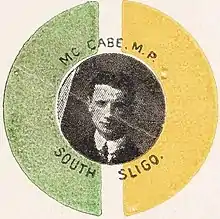Alexander McCabe
Alexander McCabe (Irish: Alasdar Mac Cába[1]; 5 June 1886 – 31 May 1972) was an Irish Sinn Féin (later Cumann na nGaedheal) politician. He was born in County Sligo in 1886.
Alexander McCabe | |
|---|---|
.jpg.webp) McCabe in c. 1922 | |
| Teachta Dála | |
| In office May 1921 – June 1927 | |
| Constituency | Sligo–Mayo East (1921 to 1923) |
| Constituency | Leitrim–Sligo (1923 to 1925} |
| Member of Parliament | |
| In office December 1918 – May 1921 | |
| Constituency | Sligo South |
| Personal details | |
| Born | 5 June 1886 |
| Died | 31 May 1972 (aged 85) |
| Political party | Sinn Féin Cumann na nGaedheal National Party |

.pdf.jpg.webp)
He was elected as a Sinn Féin Member of Parliament (MP) for the constituency of Sligo South at the 1918 general election.[2] In January 1919, Sinn Féin MPs refused to recognise the Parliament of the United Kingdom and instead assembled at the Mansion House in Dublin as a revolutionary parliament called Dáil Éireann, though McCabe did not attend as he was in prison.[3]
At the 1921 Irish elections, he was re-elected for Sligo–Mayo East. He supported the Anglo-Irish Treaty and voted in favour of it. He was again re-elected for Sligo–Mayo East at the 1922 general election, this time as pro-Treaty Sinn Féin Teachta Dála (TD). During the Treaty debate he asserted that the counties of Ulster which comprised "Northern Ireland" could never be incorporated into an Irish Republic while the British Empire was what it was.[4]
At the 1923 general election, he was elected as a Cumann na nGaedheal TD for Leitrim–Sligo.[5] He resigned from Cumann na nGaedheal in 1924 because of dissatisfaction with government attitude to certain army officers and joined the National Party led by Joseph McGrath.
He resigned his Dáil seat in March 1925 along with several other TDs, and at the resulting by-election on 11 March 1925 was won by the Cumann na nGaedheal candidate Martin Roddy. He did not stand for public office again and returned to his post as a schoolteacher.
In the 1930s he was involved with the short-lived but widely followed Irish Christian Front, serving as the organisation's secretary and announcing its creation to the public on 22 August 1936. He was also a member of the Blueshirts during this period and the later the Irish Friends of Germany (later known as the 'National Club') during the Second World War, a would-be Nazi Collaborator group in the event Germany invaded Ireland. McCabe chaired their meetings, denied the group was a fifth column and expressed the belief that a German victory would lead to a United Ireland. He was interned in 1940–41 because of his pro-German sympathies, which he claimed resulted from the desire to ‘see the very life-blood squeezed out of England’.[6][7]
Sources
- Todd Andrews (1979), Dublin Made Me.
- Robert Fisk (1983), In Time of War.
References
- Price, Dominic (7 March 2012). The Flame and the Candle. ISBN 9781848899513.
- "Alasdair Mac Cába". Oireachtas Members Database. Retrieved 11 April 2009.
- "Roll call of the first sitting of the First Dáil". Dáil Éireann Historical Debates (in Irish). 21 January 1919. Archived from the original on 19 November 2007. Retrieved 11 April 2009.
- Ferriter, Diarmaid (4 October 2018). On the Edge: Ireland's off-shore islands: A modern history. ISBN 9781782832522.
- "Alexander McCabe". ElectionsIreland.org. Retrieved 11 April 2009.
- Coleman, M. (n.d.). Mac Caba (McCabe), Alasdair (‘Alec’). [online] Dictionary of Irish Biography. Available at: https://dib.cambridge.org/viewReadPage.do;jsessionid=1C4CB7D06948737BD4C3A8C04C8B6215?articleId=a4995 [Accessed 14 Feb. 2019].
- https://core.ac.uk/download/pdf/30695821.pdf